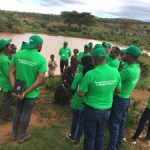EGST students, faculty and staff in Development Studies Program conducted practical field work in Yabello district, Borena Zonal Administration in Oromia Regional State. Focusing on pastoralist communities, gender, health and FBO social services the 17 practitioners stayed for four days in the field from May 18-21, 2017.
The students learned from community members on how the Borena Oromo people with a rich cultural heritage of land and economy has lost their livestock in the current drought that affected the zone.
Briefing on the current drought challenge, government officials stressed that the Borena people has lost a generation of cattle breeding experience in a state of unpredicted natural shock. They further noted that for some pastoralist families, it will be difficult to replace their livestock asset in the coming years as the frequency of drought has intensified due to severe lack of water and grass in the zone. Asked about the magnitude of the problem and the coping mechanisms, they emphasized that the situation is still under assessment where different alternative solutions are being deliberated with community members and Abba Geda (Community) leaders.
During their field investigation in Yabello, the students discussed issues with district gender experts, health professionals at different levels, agriculture and pastoralist practitioners, Youth and Sports Office, community members and FBO leaders.
Looking into the health system, the students visited zonal health office and deliberated on how the health services are operating in 14 districts of Borena zone including one urban administration. They further observed the detail operations of Yabello health center, health post and Yabello district hospital service provision. The students moreover discussed with health center officials, health extension workers and observed various wards of the institutions.
In Yabello district Women and Children Office, a briefing was made by the gender specialists with subsequent discussions on policy and practice of gender mainstreaming. The officials indicated that Borena zone has low girl education opportunities and only a handful of them were able to join higher educational institutions.

